
- •Olga a. Berezina, Yelena m. Shpilyuk
- •IV. The Present Progressive Passive …………………………………...132
- •6 Foreword предисловие
- •Авторы the article Usage of Articles
- •Bay of Bengal
- •Countable and Uncountable Nouns
- •17 The adjective and the pronoun
- •Some, Any, No
- •Not versus No
- •Much, Many, Few, Little
- •Other, The Other, Another
- •25 Different Meanings and Usage of: All, Each, Either, Neither, Every, Both
- •31 The adjective and the adverb
- •Degrees of Comparison
- •Present Simple
- •II. The Past Simple Tense
- •III The Future Simple Tense
- •The "Going To" Form
- •II. The Past Progressive Tense
- •III. The Future Progressive Tense
- •I. The Present Perfect Tense
- •II. The Past Perfect Tense
- •III. The Future Perfect Tense
- •I. The Ptesent Perfect Progressive Tense
- •II. The Past Perfect Progressive Tense
- •III. The Future Perfect Progressive Tense
- •I. The Past Simple Passive
- •II Present Simple Passive
- •III. The Future Simple Passive
- •IV. The Present Progressive Passive
- •V. The Past Progressive Passive
- •VI. The Present Perfect Passive
- •VII. The Past Perfect Passive
- •VIII. The Future Perfect Passive
- •139 The Imperative Mood
- •Modal Verbs can, could
- •May, might
- •Exercise 5
- •149 Must, to be to, to have to
- •Should, ought to
- •Recapitulation of the modal verbs
- •Conditional Sentences
- •II type
- •III type
- •If it were not for ...
- •If it hadn’t been for ... But for ...
- •189 The modal verbs "could" and "might" in conditional sentences
- •Recapitulation of conditional sentences
- •The Complex Object
- •Indirect Speech
- •Modal verbs in indirect speech
- •227 Passive voice in indirect speech
- •Conditional sentences in indirect speech
- •231 Recapitulation of indirect speech
- •Troublesome Verbs
- •244 The Participle
- •246 Appendix 1 tense forms (the active voice)
- •248 Appendix 1 tense forms (the active voice)
- •250 Appendix 3 conditional sentences
III The Future Simple Tense
Exercise 1
Translate into Russian and comment on the use of the Future Simple Tense.
54

I'll come tomorrow night.
I think he will speak to us about it.
I promise Г11 phone you soon.
The necessary papers will reach you in due course.
He will never forget it.
I suppose we'll never see him again.
Will you be back soon?
Who'll win in the today's match, what d'you think?
Ted will never forgive you, I'm sure.
Nobody will come to your parties after this incident. You behaved like a kid, you know.
I give you my most solemn promise. I'll pay tomorrow.
Exercise 2
Make the following sentences: — negative;
— interrogative.
He will arrive tomorrow morning.
He will go to Stockholm next spring.
They will return in two hours.
It will rain tomorrow.
She will be home at eight o'clock.
It will be cold this winter.
I will take part in that concert.
Liz will give you a lift to town.
It will be cold in the evening.
They will perhaps publish this dictionary in spring.
They will issue a low-priced edition of this book next month.
He will do anything to get free.
Someone will take care of the child.
They will return in a month or so.
Exercise 3
Ask questions to the following sentences beginning with the words in brackets.
She will go to school next year. (When? Who?)
I think they'll come to see us next week. (Who? When?)
55
She will see her friend at the cinema. (Whom? Where?)
Tomorrow she'll have breakfast earlier than usual. (When? Why?)
It will snow tonight. (When?)
Their group will go to London next month. (Who? When? Where?)
Ron will help her to pass her exam, Pm sure. (Who? Whom? What?)
I'll never want to see him again. (Whom? Why?)
Those happy days will never come back. (Why?)
Tina will bring this new record tomorrow: be sure to come. (Who? What? When?)
Leave the newspaper alone: I'll read it in the evening. (When? Who?)
Tomorrow our in-laws will visit us. (Who? When?)
They will go to the seaside in spring or in summer. (Who? When? Where?)
He'll never lend you money: he's too greedy for that. (What? Why?)
Exercise 4
Ask questions to the underlined parts of the following sentences.
I think I will get up earlier tomorrow morning.
We shall meet our friends next week.
He will pack his bags tomorrow morning, he is too busy tonight.
I shall read ten chapters tomorrow.
I am tired. I shall go and have a nap before dinner.
There will be a party on Sunday at the Wilsons'.
I'll walk five miles tomorrow.
They will write a test tomorrow at their French lesson.
A crowd of admirers will come to the airport to see him off.
10. I won't buy this hat. It's old-fashioned.
11. Nelly will go on a round-the-world trip with her friends.
He will return the book tomorrow.
I'm so exhausted. I think I'll go and have a bath. I'll try to relax.
56
Exercise 5
 Answer
the following questions.
Answer
the following questions.
1. Will you be very busy when preparing for your exams?
2.. Which of your lecturers do you think will examine you?
How long will your exams last?
When will you be free?
Will you have any holidays after your exams?
Now speak about your summer holidays. What do you think they will be like?
Exercise 6
The Long Sentence Game.
The rules of the game are described in Exercise 7, page 49. The first player may begin: "Next year I will go to Japan. I will see Tokyo”. The second player adds: "Next year I will go to Japan. I will see Tokyo. I will buy a car" etc.
Exercise 7
Work in pairs.
> Pattern: - Next year I will go to Paris.
- And what do you think you'll see there?
- ГМ see the Eiffel Tower:
- And what will you buy there?
- I'll buy... etc.
Exercise 8
Use the Future Simple Tense instead of the infinitives in brackets.
I (to be) very busy at the beginning of June. We (to have) our exams.
He (to come) to see me in a year's time.
He (to have) dinner in ten minutes.
This day (to come) sooner or later.
It (to be) slippery tomorrow, I'm afraid.
He (to behave) as usual, I'm afraid. You know how such people are.
You (to go) to the Opera with me tonight? They (to sing) Faust.
57
Who (to join) me? Perhaps I (to drive) end.
No one (to believe) you, I hope. And I also hope you (to stop), imagining things and talking nonsense.
I (not to go) to that party, my dear. Your sister's usual guests (to bore) me to death again.
You (to help) me or not?
How long you (to be away)? I (to miss) you.
I don't think he (to make) a really good travel agent.
Exercise 9
Translate into English.
A
Я думаю, что он придет на этот вечер.
Надеюсь, ребенок попадет в хорошие руки.
Не приходите завтра в два часа: он будет занят.
Эта зима будет очень холодной.
Я уверен, что он подпишет все документы.
Кто пойдет завтра с нами в театр?
Вы напишете мне, не правда ли?
Я не уверен в том, что он примет Ваше предложение.
Вы отправите это письмо сегодня?
10. — Когда ты начнешь читать эту книгу?
— Сегодня, и я верну её тебе на следующей неделе.
Я думаю, мы ещё увидимся до отъезда.
— Когда твоя семья переезжает в новую квартиру?
— В следующем месяце.
Ты думаешь, мы успеем к отходу поезда?
Боюсь, он заблудится!
Надеюсь, он больше не будет так себя вести.
Не торопите меня. Я всё расскажу с самого начала.
Ты покажешь мне картину?
Мы вымоем посуду позже.
Ты расскажешь мне обо всех своих приключениях? Я всё равно все узнаю — рано или поздно, так или иначе.
20. Вернусь ли я сюда когда-нибудь?
А что Вы скажете? Что теперь будет? Я приму любой Ваш совет.
58
В
1. ... Дориан, Вы думаете, что эта девушка когда-нибудь будет счастлива с человеком её круга? Она выйдет замуж за какого-нибудь грубияна-возчика или крестьянина. А из-за Вас она будет презирать мужа и чувствовать себя несчастной.
2. — Как это печально! — пробормотал вдруг Дориан Грей.— Как печально! Я состарюсь, стану противным уродом, а мой портрет будет вечно молод. Он никогда не станет старше, чем в этот июньский день... Ваш серебряный Фавн (Faun) или Гермес из слоновой кости (ivory Hermes) ... их Вы будете любить всегда. Как долго Вы будете любить меня?... Я завидую этому портрету. Почему он сохранит то, что я утрачу? Он будет насмехаться надо мной!
(О. Уайльд)
THE PROGRESSIVE TENSES
The Present Progressive Tense
Exercise 1
Translate into Russian and comment on the use of the Present Progressive Tense.
He looked at her. 'You're shaking. Are you all right?'
The rain is just beginning.
You can't talk to him. He is having dinner now.
It's snowing. Don't go out.
He isn't playing football this season.
'I'm sorry', I said, 'I'm being clumsy'.
Hello. Are you enjoying the party?
His French is getting better.
You are forgetting yourself, young man.
He isn't doing very well at school, is he?
He frowned at her. 'Being funny? Or are you trying to pretend nothing's going on?
I'm revising for my spring English exam. Please try not to bother me.
59
My friends are coming next week.
The tap is running. Can you fix it?
I'm having a clear-out. Throwing some rubbish away.
Exercise 2
Change the following sentences according to the pattern:
> Pattern: He usually has breakfast at seven, but today he is having breakfast at eight.
She usually drinks coffee in the morning, but today she ... tea.
They usually play tennis on Sundays, but today they ... football.
I usually read books in the evening, but today now I ... a newspaper.
'Usually you skate alone'.
'But today I ... with my friends'.
She usually washes the dishes at night, but tonight she ... dishes, she ... a book.
Brian usually has breakfast very early, but today he ... breakfast late.
7. They usually have lunch in the canteen, but today they ... lunch in the cafe.
8. I usually watch TV after dinner, but today I ... TV, I ... a newspaper.
9. Faith usually drinks tea with sugar, but today she ... tea without sugar. She's on a diet.
I usually do my morning exercises every day, but today I ... my morning exercises. I'm not well.
'Usually you type your essays.'
'Yes, but today I ... it. Something's wrong with my computer.'
12. Martin usually drives to college, but today he… .
Exercise 3
Make the following sentences: — negative;
— interrogative.
1. The secretary is typing a letter.
The sun is shining brightly.
60
The cat is running along the wall.
My mother is cooking a meal.
My father is reading a book.
They are having a German lesson now.
She is constantly forgetting phone numbers.
The doctor is feeling her pulse.
She is running home.
You are walking too quickly.
Margie is typing very fast.
12 You are making a lot of noise.
The lecturer is explaining some new material now.
The wind is blowing outside.
The children are singing a new song.
My brother is listening to some new record.
You are driving too slowly.
Exercise 4
The hidden Picture Game.
One of the players draws a sketch of someone doing something. Do not let anyone see what you are drawing. The others are to try to guess what the person you have drawn is doing. Ask general questions. The person who guesses correctly draws the second picture. (You can also draw pictures showing two people).
Here are some of the pictures that you can use:
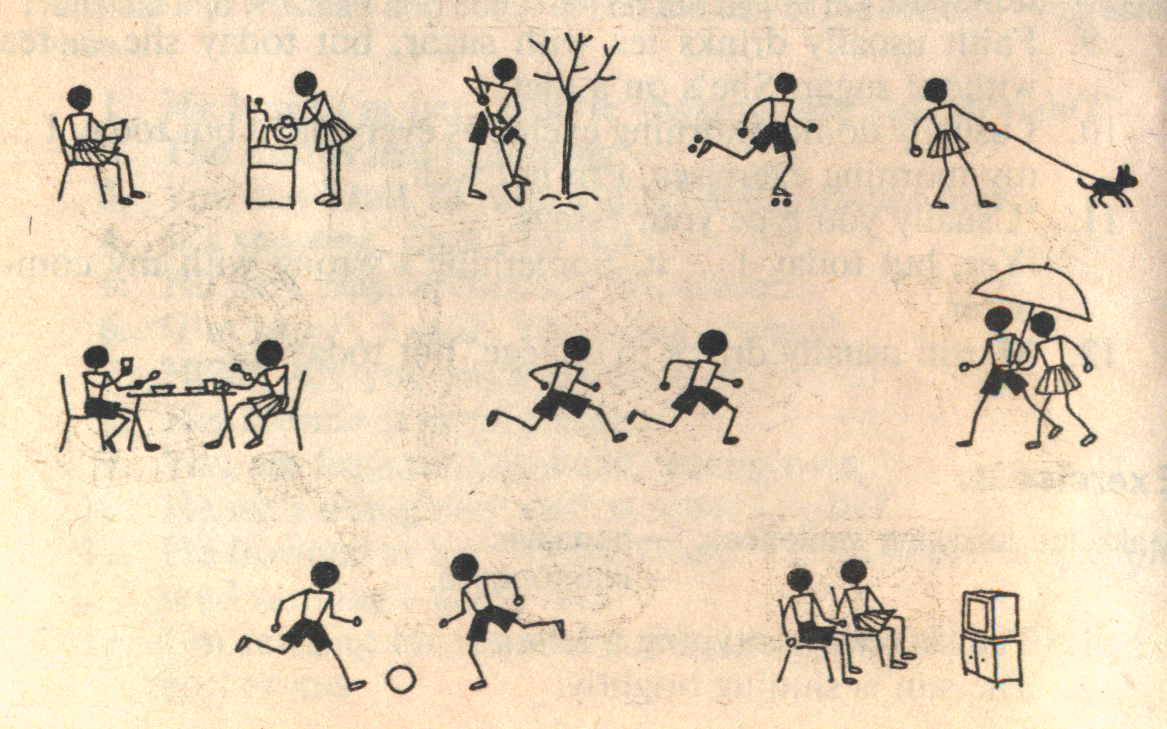
61
Exercise 5
The Verb Game.
Write down as many sentences as you can in the five minute time limit, player with the most correct sentences is the winner. Use the following verbs:
watch
make
clean
eat
listen to
write
play
have
put on
wash up
read
Choose a picture
Find the room
Write a sentence
> Pattern: He is reading a book in the living room.
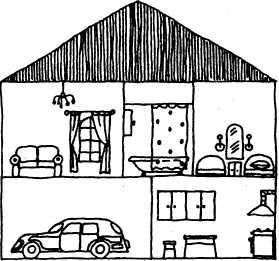
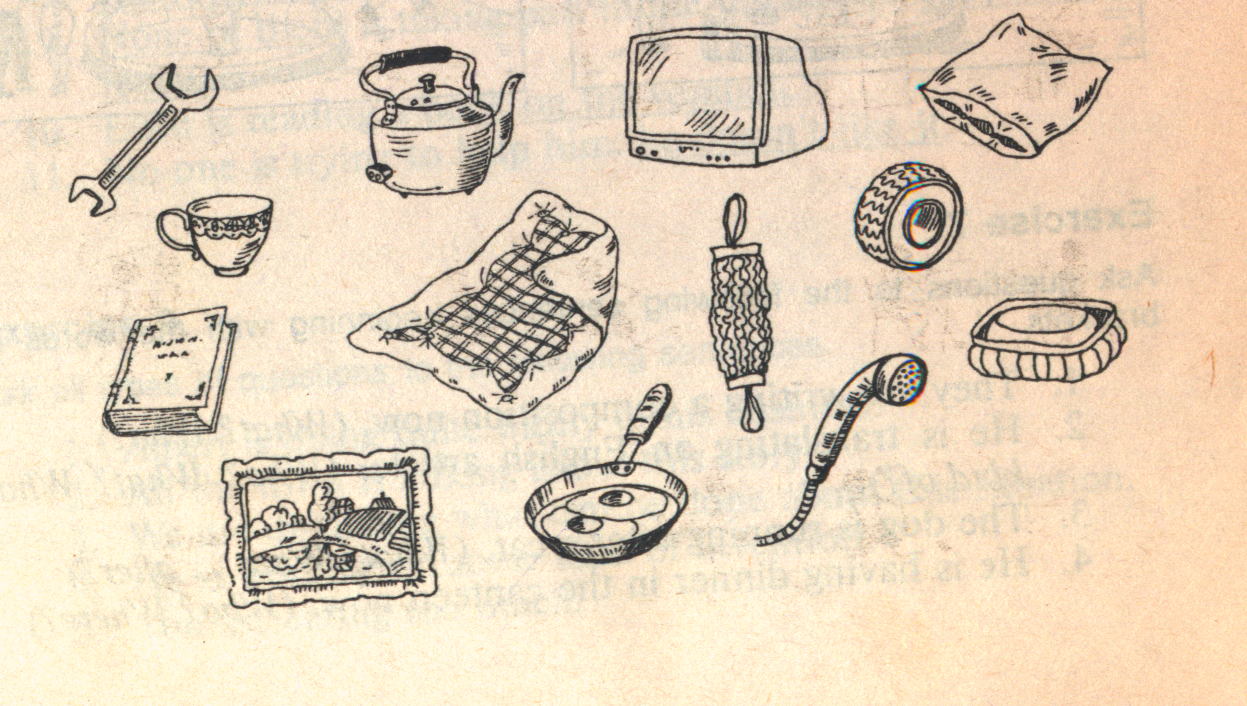
62
Exercise 6
Compare the pictures. Use the Present Progressive Tense.
A
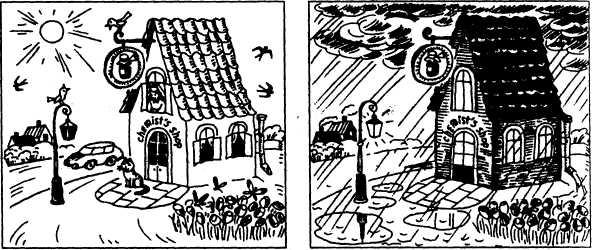
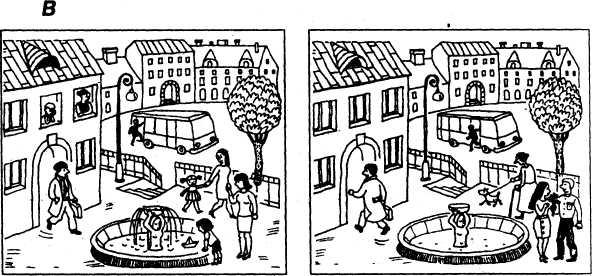
Exercise 7
Ask questions to the following sentences beginning with the words in brackets.
They are writing a composition now. (What? Who?)
He is translating an English article. (Who? What? What kind of?)
The dog is running after a cat. (What? What … after?)
He is having dinner in the canteen now. (Who? Where?)
63
She is looking for her glasses. (Who? Where? What ... for? Why?)
I'm learning this poem by heart. {Who? What? How?)
7. They are building a new school in our street. (What? Where?)
She is opening a letter from her mother. (What? What kind of?)
She is constantly nagging her husband. (Why? When?)
Tony is painting a new picture. (Who? What? What?)
You are talking too fast. (How? Why?)
My parents are redecorating our dining-room now, because they never liked its style. (Who? What? What? Why?)
Exercise 8
Ask questions to the underlined parts of the following sentences.
It is raining heavily outside.
They are trying to translate this exercise.
He is drinking tea in the garden.
Cinema audiences are declining now.
She's listening to the rock music.
You are trying to persuade him, but he won't listen.
They've moved to a new house and are buying new furniture.
You are constantly mispronouncing this word, because you're inattentive.
None of them is taking part in the discussion: they are not ready.
Ellen is reading a book on the veranda.
No one is trying to help him: he doesn't like it.
Exercise 9
Ask all types of questions to the following sentences.
Albert is doing quite nicely in his business.
All the town is talking about this story.
We are discussing what can be done about this situation.
He is working on some kind of invention.
5. You are eating too much.
64
I am having dinner now.
Aunt Betty is talking to the butcher in the kitchen.
He is being somewhat strange today.
Liz is trying to fix her washing machine.
My parents are talking about Fred's new car.
I am dreaming about summer.
Archie is always talking about his baby son.
We are trying to talk Ron out of it.
Exercise 10
Use the Present Progressive Tense instead of the infinitives in brackets.
A
Look! It (to rain).
Why you (not to wear) your coat today? It's so cold.
Excuse me, I (to look for) the post-office. Is there one near here?
You (to make) a lot of noise.
They (to quarrel) again!
He is on holiday. He (not to work) today.
You (to read) any English books now?
They (to have) an English lesson. The teacher (to write) new words on the blackboard and (to explain) their meanings. The students (to sit) at the tables and (to make) notes. Through the window we see the school yard. The school children (to run about) there. They (to have) an interval between their lessons.
What you (to talk) about?
Jim (to take) his driving test now.
'What you (to do) at the moment? Can you help me with my project?'
'Oh, I'm busy just now. I (to fix) my mixer. But if you can wait...'
'Yes, I can. We (to write) several projects this semester.
I don't know what to do about this one.'
'What you (to play)? Is it something that I know?'
'It's mine.'
'You (to play) wonderfully.'
'What Tom (to do)? Why he (not to practise)?'
'He (to have) some rest.'
14. I constantly (to forget) things.
65
What you (to wait for)? Why you (to sit) here?
What Barry (to try) to get at?
'Stop making that noise!'
'And what you (to do)?'
‘I (to try) to get some sleep!'
В
In a bed in the corner of the room her little boy (to lie) ill. He has a fever, and (to ask for) oranges. His mother has nothing to give him, so he (to cry). (O. Wilde)
We (to be) all truthful now, we (not to be)? (J. B. Priestly)
Robert: I (to wait) for your explanation. (J. В. Priestly)
Rоbert: I (not to say) good-bye to you I don't know you.
I (to say) good-bye to this [Indicates her face]. (J. B. Priestly)
I (to get) chilled to the bone. (B. Shaw)
Whatever you (to do) here? (B. Shaw)
They (to use) the telephone. (B. Shaw)
I (to behave) myself perfectly. (B. Shaw)
You (not to listen) to a word I (to say) ... and I (to make) the most delightful plans for your future. (O. Wilde)
Olwen: Let's leave it alone.
Miss Mockridge: ...Oh no, I (to enjoy) it — very much. (J. B. Priestly)
Exercise 11
Use the Present Simple or the Present Progressive Tense instead of the infinities in brackets.
1. I (to think) you (to behave) rather foolishly, honey.
2. I (to think) about your behaviour. What you (to think) you (to do)?
3. Your German (to get) better?
4. I (to see) that you (to have) some problems with this computer. Can I be of any help?
He (to understand) the rule, but he still (to make) mistakes too often.
66
6. 'You (to believe) his story?'
'Oh no. I never (to believe) him. He always (to tell) lies.'
How many parts this text (to consist of)?
'Listen! You (to hear) that noise?'
'That's our neighbours. They (to shout) again. They never (to tire) of it.'
'They always (to shout) like that?'
Now I (to see) everything clearly. You (to try) to swindle.
That won't do!
Who this house (to belong) to?
'Hello there! Where you (to think) you (to go)?'
'I (to want) to go to the disco.'
'No. You (to do) your lessons now. And I (to mean) it.'
12. 'Where's Mom?'
'She's in the kitchen. She (to cook) dinner.'
'I (to think) П1 go and give her a hand.'
'Don't! She (to be) sulky today. She (not to want) to see anyone.'
'Why he (to look) so gloomy?'
'Oh, he (to have) a toothache.'
'What you (to look) at?'
'I (to look) at the girl over there. You (not to think) her dress is wonderful?'
15. 'What you (to think) about?'
'I (to think) that I won't really enjoy the party tonight.'
'You (to say) that I must go alone? You (to go) with me, and that's that'
'Tony (to feel) something's wrong, but he can't say what.'
'Well, I (to believe) we'll soon learn everything.'
17. 'What we (to wait for)?'
'We (to wait for) Mother. She (to choose) presents. She (to think) that one of those dresses will do for Jessie, so now she (to look over) them and (to feel) the fabric'.
'What Esther (to think) about it?'
'She (to find) it all very strange.'
You (to believe) in Santa Claus?
Gerry always (to find fault with) me.
Your letters (to be) very welcome, but he (to want) to know everything at first hand.
67
Exercise 11
Translate into English.
A
1. — Кто сейчас сдает экзамен?
— Моя подруга.
— Почему Вы не смотрите телевизор?
– Я готовлюсь к занятиям.
У тебя всё еще дрожат руки.
Вечно она со всеми ссорится!
5. Он работает теперь в другом месте, и дела у него идут хорошо.
6. — Что делает твой племянник?
— Он работает в саду.
7. — Почему она плачет?
— Я не знаю. Я стараюсь успокоить её.
8. — Откуда Вы идете?
—Из магазина.
9. У них сейчас урок немецкого языка.
10. Мы сидим у окна, ярко светит солнце, мимо нашего дома спешат люди...
11.Студенты слушают объяснения преподавателя.
12. Куда Вы спешите?
13. — Что ты ищешь?
— Я ищу свои часы.
14. Почему ты всегда ворчишь?
15. — Что ты о нём думаешь?
— Я думаю, что он хороший собеседник.
16. — О чём ты думаешь?
— Я думаю о каникулах.
17. — Сколько глав в этой книге?
— Десять. Сейчас я читаю седьмую. Вы хотите взять её?
— Да, если можно.
18. Он ведет себя ужасно.
19. Я надеюсь, что он не опоздает.
Я знаю, что ты не любишь ходить по магазинам.
Сейчас мы подходим к церкви XIV века. Каждый год тысячи туристов приезжают в наш город, чтобы полюбоваться ею.
68
В
Кто пытается Вас обмануть? (Б. Шоу)
Элиза: О чем же тогда речь?
Хиггинс: Я пытаюсь выразить, насколько я презираю коммерческий подход к жизни, (my contempt for commercialism) (Б. Шоу)
Хиггинс: О чем же мы спорим? (Б. Шоу)
Миссис Хиггинс: Экипаж ждет, Элиза. (Б. Шоу)
— Чего же мы ждем?
— Мы ждем маму. (Дж. Даррелл)
Дорогой мой, я не принижаю твоих достоинств. (Дж. Даррелл)
О, я замечательно провожу время! (Дж. Даррелл)
— Ты предаёшь своих друзей или ты угрожаешь нам?
Почему ты рассказываешь нам об этом?
— Я просто пытаюсь избежать неприятностей. (Дж. Р.Р. Толкин)
